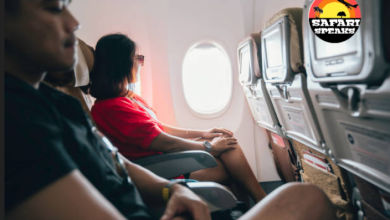Older and Disabled Traveler: How To Travel With A Disabled Person

How best can one travel with a disabled or older person? Many travelers especially those who wants to travel with their loved ones that are old and/or disabled but do not really know how to go about it. This blog post is really composed to give many tips that can be of help to those who have found themselves in this category.
Count yourself lucky among all our readers that you are among those favoured to read this top notch tips of ours. It has been seen that travels no longer belongs to the young and able-bodied. In fact, travelers that are elderly or disabled often have especially wonderful trips, simply because they have an extra helping of the very qualities that make travel successful – resourcefulness, adventurousness, cheerfulness, a sense of humor and a careful planning.
Traveling Tips With The Old
Senior citizens and retirees have become a major part of the traveling public, and the travel industry is courting them with a wide array of discounts and special deals. As always, however, you must ask for your discount or you may not receive it. To facilitate things, carry identification with proof of your age and membership in senior organizations.
Foreign travel is an excellent bet for the older person. In most other countries of the world, you will find, older people are far more honored than they are in the U.S.A. If you’re over 50, you can join the American Association of Retired Persons (AARP). This organization has a travel service that designs tours, cruises, and holiday packages especially for senior travelers. In addition, their card will allow you to receive discounts on some airlines, many hotels, rental cars, and more.
These following tips can help the aged and retired to make a good travel without stress:
- If you’re a retiree you may have a flexible schedule that permits you to travel at off-peak hours. This way you can avoid the stress of long lines and you may also save money. Try to fly mid-week, midday, or Saturday. Avoid traveling on Mondays and Fridays, which are heavy travel days.
- Thirty days before departure date, call the airline for an advance seat assignment. The most comfortable and accessible seats are on the aisle and toward the front of the aircraft. The bulkhead seats have extra leg-room. Remember, however, that you may be sitting next to parents with babies.
- Seniors, especially, need to travel light. You want to be sure that you can carry all your belongings yourself when you need to. For walking through the airport, portable wheels on your suitcase are handy – but make sure that they won’t be cumbersome for the many times you will have to carry them (getting into buses and cabs, climbing stairs, getting over curbs).
- Plan to arrive at the airport in plenty of time – at least an hour ahead of departure time for domestic flights, and two hours for overseas flights. Watch the television monitors for information on departure times and gate assignments.
- Most airlines offer early boarding to elderly passengers needing assistance.
- Wear comfortable clothing for the flight. Bring along some slipper to wear during the flight, and an eye shade or ear plugs if the muted din of an airplane would disturb you.

One of us had a grandmother who traveled the world with a packet of good tea and a bone china teacup wrapped up in her lingerie. Think of ways you can pamper yourself while you’re on your trip. Perhaps it’s a down pillow – you can buy one that will squash down to nothing in your suitcase. You’ll find that being able to indulge in a familiar custom in a strange surrounding will give you a sense of security, even luxury.
One experienced traveler we know recommends that you run through in your mind all the potential snafus of your trip. Then visualize how you will cope with them. In many cases, proper planning can alleviate your anxieties. For example, if you are concerned about missing a plane connection, schedule extra time between flights – two hours may be better than one.
If you are concerned about getting around with your baggage, either pack very light or bring along a set of collapsible wheels that can be folded up when not needed. If you are concerned about health emergencies, join an “assistance” plan. Think through all such potential problems and anticipate their solutions. Many discounts exist if you ask for them and have proof of your age. For example, seniors and disabled travelers receive 25 percent off all regular one-way Amtrak fares of $40 or more, except on Metroliners.
Tips To Keep In Mind When Planning A Trip
The sheer numbers of wheelchair travelers have prompted the travel industry to compete for the disabled market. There is a wealth of guidebooks and services available, airports and hotels become more accessible every day, and dozens of travel agencies now specialize in vacations for the disabled traveler. So much is possible – we have friends who have traveled in wheelchairs through South America, Africa, and India, as well as Europe and North America.
If, however, you would like to make your own arrangements, or if you’re headed somewhere exotic that isn’t covered in a guidebook, here are a few tips to keep in mind while planning.
- Have your wheelchair checked by a wheelchair mechanic before you go. Bring along a tool kit and spare axle.
- Travel at less busy times – midweek, midday, Saturday.
- Tell the reservation clerk of your disability.
- Take a nonstop or direct flight so that you need not change planes.
- Arrive at the airport early. You will “preboard” the plane.
- Put a baggage tag on your wheelchair, which will probably be transported in the baggage compartment. Make sure it will be brought to the door of the plane when you reach your destination, and not to the baggage claim.
- Crutches and canes may be stowed under your seat if they do not stick out into the aisle.
- Guide and hearing dogs can travel on board a plane with their owners, free of charge. They are supposed to sit or lie at your feet. If you are going to a foreign country, however, there may be a quarantine that applies to your dog.

Questions To Ask When Making An Airplane Reservation For Disabled Traveler
These questions should always be considered before a disabled person accompanies you for travel or maybe you are traveling alone. Do well to make extensive enquires before making any reservations with any airline. These following questions should always come to mind:
- Does the airline have any special requirements’ For example, will they require that you be accompanied? Sometimes the airline will waive such a requirement it you seem competent and confident.
- What type of aircraft is it – wide-bodied or narrow-bodied?
- Where will your wheelchair be stowed?
- Does the particular flight have jetway for boarding and disembarking? If not, how will you get on and off the plane? Some airlines have a narrow boarding chair, others use a lift
- Are special seats assigned to wheelchair passengers?
If you cannot walk, you will require assistance in order to use the rest room. However, In the future it is likely that airplanes and airplane rest rooms will be designed to accommodate wheelchairs
Questions To Ask When Making A Hotel Reservation For A Disabled Traveler.
- Is there special disabled parking’
- Are there ramps from the parking area to the sidewalk and then into the building
- How far will your room be from the elevator?
- How wide are the doorways into the rooms and bathrooms? 26″ is minimum
- Are there grab bars at toilet and tub?
If you are traveling alone, you may need to know the height of light switches




